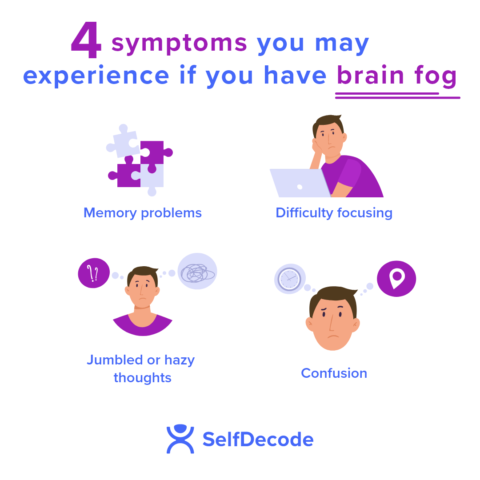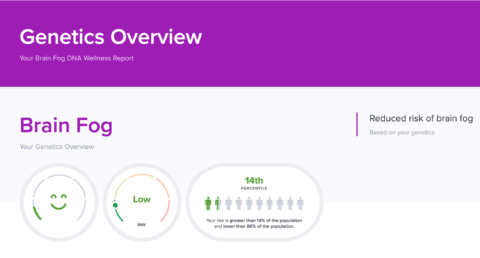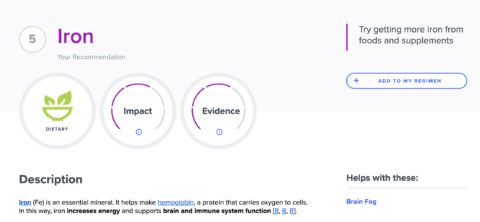
Are you experiencing a lack of mental clarity or an inability to focus? Read on to find out what can be causing your brain fog, symptoms, and what you can do to improve your cognitive function.
What is brain fog?
First, let’s begin with what brain fog isn’t: despite being very common, it’s not a recognized medical condition. Rather, it’s a term used to describe a set of symptoms. It’s also known as ‘mental fog’ and ‘cognitive dysfunction’, and it can be caused by a variety of factors.
A foggy brain can make even the simplest everyday decisions hard, and it can interfere with your daily life. It’s important to understand the symptoms you’re experiencing, how it’s affecting you, and why.
If you know what brain fog feels like, you may be wondering why it’s affecting your ability to think clearly. This post is aimed at helping you better understand the cause of your symptoms so you can be successful in addressing the root of your problems.
Brain fog symptoms
Brain fog can manifest itself differently depending on its cause, and the duration of the symptoms can also vary from person to person. You may have trouble making decisions or find yourself unable to concentrate for a long period of time.
Some symptoms include, but are not limited to:
- Inability to focus or concentrate
- Reduced mental clarity and cognitive function
- Loss of short- and long-term memory
- Attention problems
- Fatigue
- Confusion
- Irritability
- Slow thinking
Anyone can experience brain fog symptoms during their life, either because of a bad night of sleep, stress, or any other possible cause. However, if your symptoms persist over time and they are affecting your quality of life, you may need to address the underlying root cause of your symptoms.
What causes brain fog?
Many things can cause you to experience brain fog, and it’s important that you understand what exactly is causing your symptoms. This will help you treat it by targeting the root cause of your health problem.
While brain fog may have several causes, scientists believe that nearly all involve inflammation and free radicals damaging the part of your brain that’s responsible for your cognitive function.
Here, we’ll list 7 possible causes that may be triggering your brain fog. Keep in mind this is not an exhaustive list – there are other factors that can contribute to cognitive dysfunction.
Stress
Chronic stress can cause mental exhaustion and may trigger inflammation. When you experience mental fatigue, it may result in a foggy brain, making it difficult for you to think clearly.
Sleep
A lack of sleep or poor sleep quality may leave you exhausted and cause you to experience brain fog symptoms. Research shows that if you don’t get enough sleep, it can disrupt your brain’s ability to communicate, affecting memory and visual perception.
Hormones
Hormonal changes throughout your life may trigger brain fog. This can happen during pregnancy or menopause, when there are variations in your estrogen levels. This shift in hormone levels may cause you to experience symptoms.
Vitamin deficiency
Many nutrients play a role in brain function, so if you’re deficient, it may cause you to experience mental fogginess. Some of the most common nutrients that may be lacking in your diet and could affect your brain function include vitamins B12 and D, and omega-3.
Food sensitivities
If you have a food sensitivity, you may experience brain fog after eating certain foods. Some common culprits of food sensitivities include gluten and dairy. Eliminating these foods from your diet may help you improve your symptoms.
Genetics
While there are no specific genes that cause brain fog, you could have genetic variants that predispose you to issues like inflammation or oxidative stress. These issues can lead to symptoms like brain fog and poor cognition, which is why it’s important to ensure that your genes are functioning optimally.
Medications
Some drugs, both prescription and over the counter, may cause you to have brain fog symptoms. Switching to another medication or lowering your dosage may help, but you should discuss your options with your doctor before making any changes.
Medical conditions associated with inflammation and fatigue can cause you to experience cognitive dysfunction. Here, we’ll list some disorders that may be contributing to your symptoms.
Anemia
An iron deficiency may cause you to feel fatigued and unmotivated, and unable to function properly. If you don’t get enough iron, your body is not able to effectively transport the oxygen required to generate energy, leaving you feeling mentally exhausted.
Hypothyroidism
Brain fog is a possible symptom of an underactive thyroid. In order to function properly, your brain requires healthy levels of thyroid hormone, which is not achieved if you have this disorder.
Chronic fatigue syndrome
If you experience severe and ongoing fatigue, it can lead to problems in memory and concentration, and cause you to feel confused, common symptoms associated with brain fog. It can be heightened in some situations, like when you’re feeling especially fatigued or anxious.
Lupus
Many people dealing with lupus report having symptoms such as memory loss and trouble focusing. While inflammation is thought to contribute to these symptoms, the exact cause of ‘lupus fog’ is unknown.
Anxiety & Depression
When dealing with anxiety and depression, you may experience memory problems, a lack of motivation, and a change in your sleep patterns, all of which can be associated with a foggy brain.
ADHD
Some people with an attention disorder report difficulty focusing and problems with their memory, symptoms that overlap with mental fog.
Is there a brain fog test?
There is no single test for brain fog. Rather, as it might be a sign of an underlying condition, you need to take into consideration all of your symptoms as a whole to figure out what’s causing your mental fog.
Some blood markers can help you identify the cause of your brain fog. For example, a vitamin B12 deficiency could be related to why you’re experiencing symptoms.
Keep in mind that just because your lab results are normal, it doesn’t mean they are in their optimal range. You can upload your lab test results to a lab analysis service such as SelfDecode Labs to see what you can do to optimize your levels and improve your cognitive performance.
Brain fog treatment
Treating brain fog is not a one-size-fits-all. It depends heavily on what is the cause of your symptoms. If you have a nutrient deficiency, for example, simply taking a supplement might help ease your symptoms. You should talk to your doctor to discuss your options.
Either way, there are a few things that you can easily do that may help not only your symptoms but also your overall well-being, such as:
- Getting a good night sleep
- Practicing regular exercise
- Eating a balanced diet
- Managing your stress levels
- Stimulating your brain
How can SelfDecode help your brain fog?
Many health conditions associated with mental fogginess have a genetic component. This means that if you know what your risks are, you can take steps to actively combat the genetic variants that put you at an increased risk of experiencing symptoms.
For example, the PARP1 gene relates to inflammation and oxidative stress and can affect your overall brain function. Variants of this gene can influence many aspects of your cognitive ability and cause chronic brain fog, but there are precautions you can take to counteract the negative effects of this gene.
If you find out that your genes make you more likely to experience a health issue, it doesn’t mean there’s nothing you can do about it. Just like genetics can influence your risks for health conditions, it can also affect how you’ll respond to strategies to combat your risks. In fact, understanding your genetics can help you focus on what is more likely to work for your body.
If you’re interested in optimizing your health with a gene-based approach, you should check out SelfDecode. SelfDecode is a DNA testing company that uses AI and machine learning to analyze up to 83 million genetic variants and give personalized recommendations based on DNA and labs.
SelfDecode can offer you over 30 DNA Wellness Reports that cover a wide variety of health topics, many of which are associated with cognitive dysfunction, including:
- Fatigue
- Sleep
- Anxiety
- Stress
- Mood
- Gut Health
Best of all, SelfDecode offers a dedicated Brain Fog DNA report that includes gene-based strategies to help you clear your mental haze. This report analyzes over 5,700 variants and gives your genetic risk score and personalized recommendations to help you optimize your brain function.
Let’s look at the TMPRSS6 gene, for example. A certain variant of this gene has been linked to low iron levels, which can be detrimental to cognitive function. As explained before, iron helps transport the oxygen that your body needs to make energy. If you have this variant, you may want to pay closer attention to your iron intake.
Unlike other DNA testing companies that only give your genetic risk scores, SelfDecode goes a step beyond by also providing personalized diet, lifestyle, and supplement recommendations tailored to your genes to help you supercharge your brain.
With SelfDecode, you will also get access to other tools such as SelfDecode Labs for insights into how to get your labs to their optimal range. This way, you’ll receive the fullest picture of your health.
SelfDecode reports are not intended to be used as a diagnostic tool. Rather, they can help you learn more about your genetics and the impact it has on your brain. Still, it’s always recommended that you consult with your doctor.
Takeaway
Although not a medical condition, a foggy brain can seriously impact your quality of life. Understanding the root cause of your brain fog is imperative to treating your symptoms. While it can be frustrating feeling like you’re in a mental fog, there are steps you can take to improve your symptoms.
If you want to optimize your cognitive function, you can use tools like SelfDecode to help you understand what are your genetic predispositions to conditions associated with brain fog. You’ll get personalized diet, lifestyle, and supplement recommendations to help you combat your genes and improve your health.
Learn More
- Are Allergies Genetic?
- Is Depression Genetic Or Environmental? Risks & Ways To Deal
- Is anxiety genetic? How DNA tests for anxiety can help you




